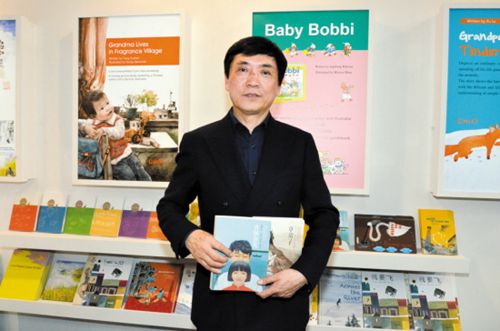By Hu Yifeng, special commentator of CNTV
Chinese children's fiction writer Cao Wenxuan won the Hans Christian Andersen Prize of the 2016 International Board on Books for Young People (IBBY) at the Bologna Children's Book Fair in Italy on Monday. He's the first Chinese writer to win the prize dubbed, "The Nobel Prize" for children's literature. That reminds people of Mo Yan, the Nobel laureate. Cao had spoken highly of Mo in an interview, attributing Chinese literature's going international to him.

"Mo Yan demonstrates the internationality in Chinese literature of which children's books are a part."
From Mo to Cao, and from adult literature to children's, the two paths of Chinese literature going international are on full display. They have won honorable prizes, and illustrated the Chinese writers' courage to confront difficulties in literary exploration, which echoes the modern China's transition from an ancient civilization to its modernization.
Readers of Mo must have felt unfathomed sufferings through his narration, where the author depicts a magic veil with exaggerated writing-style to cover a nation's arduous growth from plight.
In Cao's works, readers can see such hardships, frustrations and maturing as well, only this time through an individual life as in the books of the "Grass Hut", "Fire Mark" and "Goats Don't Eat Grass in Paradise."
In each exquisite tale, specific historical events and times are blurred, yet a sense of history gushes out from underneath the narration.
"Cao writes stories about a childhood full of sorrow and bitterness," said Patricia Aldana, the Hans Christian Andersen Jury President 2016. "His stories are wonderful and set examples for children to face difficulties and challenges in life."
Cao said the cornerstone of his writings is about morality, aesthetics, and sympathy. Different from the mega-narrative of a nation's fate and destiny, writing about individual experiences stand as a micro perspective.
Yet it can demonstrate how humanity develops morality and principles that come into being, which show the unique beauty of life that is thought-provoking.
Then there is the shadow of a little kid in Cao's literature. It comes part from the author's childhood memories but mostly from the juvenile perspective adopted in his writings. It is not "adults tell stories to the young children."
The reading experience reminds people of their childhoods and makes them feel like talking to their younger selves. Through this transcendent experience, readers capture a different perception of the past and present.
In Mo's literature, we could see human integrity in a calm and deliberate attitude towards difficulties. In Cao's elegant and exquisite writings, we see a tenacious and cool style to deal with rough patches in life.
A Western philosopher had once called ancient China "a premature child." Nonetheless the systems and cultures in ancient China have somehow pulled ahead of the times, which look like a historical picture filled with absonant elements that could lose a youthful spirit.
Cao's novels and his global acclaim are telling the world that Chinese culture is rejuvenating in her own way, which is why we should give Cao the warmest applause.
( The opinions expressed here do not necessarily reflect the opinions of Panview or CCTV.com. )

Panview offers an alternative angle on China and the rest of the world through the analyses and opinions of experts. We also welcome outside submissions, so feel free to send in your own editorials to "globalopinion@vip.cntv.cn" for consideration.















